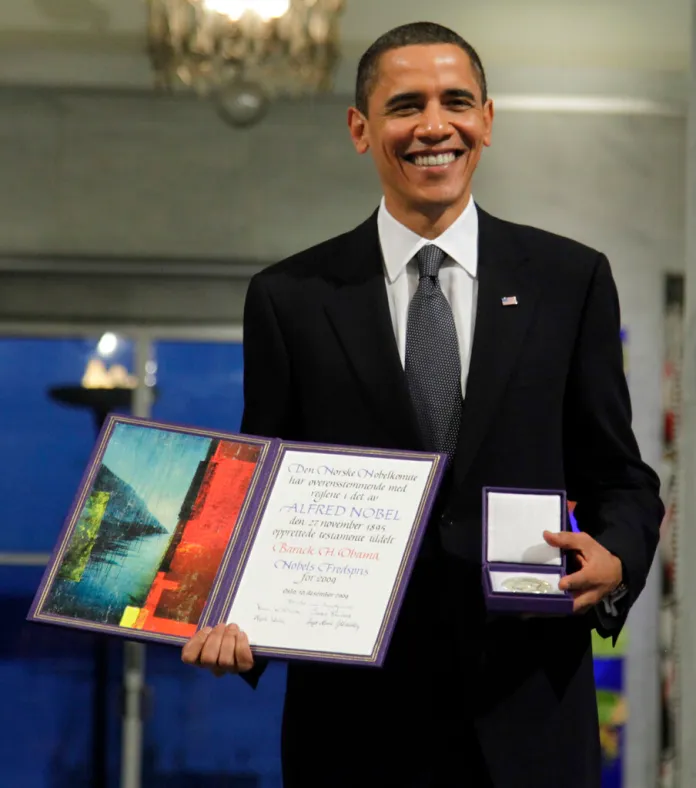As speculation grows over whether President Donald Trump will receive the Nobel Peace Prize on Friday, the award’s history includes several recipients whose selections have drawn controversy.
The Nobel committee recognizes figures in the fields of physics, chemistry, literature, economics, and medicine, as well as diplomats who help secure peace. Trump, who is under consideration for the award, just announced a ceasefire between Israel and Hamas. Because of his track record in securing peace, Trump boasts a resume highlighting accomplishments greater in number and importance than many past winners.
With one day left until the announcement of this year’s coveted peace prize, here are some of the Nobel Peace Prize’s most contentious or perceived as undeserving winners:
Abiy Ahmed
Ethiopian Prime Minister Abiy Ahmed was awarded the Nobel Peace Prize in 2019 for brokering a peace deal with the neighboring African country of Eritrea that ended a decadeslong military stalemate. Since then, Ethiopia has been involved in several major conflicts.
One of these conflicts was a civil war in the Tigray region, where hundreds of thousands of people underwent widespread displacement and suffered from a severe famine. The war began in 2020, one year after Abiy’s acceptance of the award, and ended in 2022.
The Nobel committee later admonished Abiy for launching a military offensive in response to an attack on a military base.
“It must be emphasized that Abiy Ahmed’s prize was awarded on the basis of his efforts and the justifiable expectations that existed in 2019,” the committee said, adding that “the historical backdrop included an authoritarian governing system and widespread ethnic conflicts.”
“As prime minister and winner of the Nobel Peace Prize, Abiy Ahmed has a special responsibility to end the conflict and contribute to peace,” the committee stated.
Barack Obama

In 2009, then-President Barack Obama won the Nobel Peace Prize “for his extraordinary efforts to strengthen international diplomacy and cooperation between peoples.” Years later, however, the former director of the Norwegian Nobel Institute admitted Obama’s reception of the award was overrated.
“No Nobel Peace Prize ever elicited more attention than the 2009 prize to Barack Obama,” Geir Lundestad said.
“Even many of Obama’s supporters believed that the prize was a mistake,” he added. “In that sense, the committee didn’t achieve what it had hoped for.”
At the time, many critics thought Obama, less than one year into his first term, was undeserving of the prize. Some argued he hadn’t done enough to merit the award by the end of his time in office.
In 2016, the Cato Institute called on the Nobel committee to revoke Obama’s peace prize because the United States had been involved in “eight years of continuous warfare” in Iraq, Afghanistan, and several other foreign countries throughout his two terms.
Yasser Arafat

Yasser Arafat, the former leader of the Palestinian National Authority in Gaza, won the 1994 Nobel Peace Prize alongside Israeli Prime Minister Yitzhak Rabin and Israeli Foreign Minister Shimon Peres for their efforts in negotiating the first part of the Oslo Accords the year before.
The peace treaty, however, did not create lasting peace between Israelis and Palestinians in the Middle East.
Arafat himself was also criticized because of his history with the Palestine Liberation Organization since the 1960s. The group carried out acts of terrorism and violence against Israelis.
The controversy led to the 1994 resignation of Kare Kristiansen from the Norwegian Nobel Committee. Kristiansen called Arafat the “world’s most prominent terrorist” and said his past was “too tainted with violence, terrorism and bloodshed” for the peace prize. Arafat died 10 years later.
Rigoberta Menchú
In 1992, Guatemalan human rights activist Rigoberta Menchú was recognized for her work in promoting social justice for the rights of the indigenous population in the Central American country.
Her work gained international attention after the publication of her 1983 autobiography, I, Rigoberta Menchú: An Indian Woman in Guatemala. The book was riddled with factual inaccuracies, causing people to question why she received the Nobel Peace Prize.
Anthropologist David Stoll challenged some key events from her bestselling memoir, arguing she had distorted her family history to more broadly align with the plight of poor Guatemalans. Stoll also challenged Menchú’s account of her brother’s death, saying she was not present at his execution.
In response to the allegations, Menchú said her memoir was a “composite” or “collective testimony” rather than a true autobiography so that she could touch on the broader suffering of her people.
The Nobel committee defended Menchú’s award, saying her work in social justice and indigenous rights went beyond her partially fabricated autobiography. The award’s presentation was timely, considering it came a few days after the 500th anniversary of Christopher Columbus’s discovery of the New World.
Henry Kissinger

In 1973, Secretary of State Henry Kissinger accepted the Nobel Peace Prize for helping negotiate a ceasefire in the Vietnam War that year. The award was jointly shared with North Vietnamese leader Le Duc Tho, but he refused to accept it because he correctly predicted the ceasefire wouldn’t last very long.
The award was controversial at the time because Kissinger was accused of war crimes related to the overseas conflict, particularly his role in initiating bombings of Hanoi during the ceasefire talks to force North Vietnam to return to the table.
In protest of the decision, two Nobel committee members resigned because they believed lasting peace had not been achieved.
THE CASE FOR TRUMP WINNING A NOBEL PEACE PRIZE
The Vietnam War continued for another two years after the United States withdrew its troops from the Southeast Asian country. The conflict ended with the Fall of Saigon in 1975, leading to the collapse of the South Vietnamese government.
Kissinger also faced criticism for his involvement in the bombings of Cambodia and Laos, among other incidents involving foreign policy.
